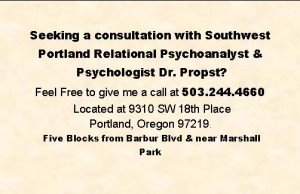“Your worst enemy can’t wish on you what you can think up yourself.”
–a Yiddish proverb
SELF-SABOTAGE MEANS ANSWERING “YES” TO ANY OF THE FOLLOWING:
“I can’t say no.”
“I am a skilled procrastinator.”
“I have difficulty even deciding what I want from life.”
“I always end up in bad relationships with alcoholics or losers.”
“I never seen to be able to maintain a healthy life style.”
“When people disagree with me, I get stuck and can’t go on.”
“I always end up trying to please bullies.”
“When conflict happens in an organization, I always manage to be the scapegoat and get myself blamed.”
Self-Sabotage can arise from either a lack of emotional awareness as to how you are impacting others or how they are impacting you. Self-Sabotage can also arise from an inability to shift your emotional responses when the current situation requires such flexibility or a different response from you. Increased facility in these areas is called emotional intelligence. Some people feel reassured when others attack them. At times it is reassuring–it gives one a sense of oneself–one knows who their enemies are. They may even feel more relaxed when they are attacked. Such individuals sabotage themselves by staying in “bad” situations. Likewise, everyone wants to have an impact on others. If you have not developed the skill to know when your impact is positive and when it is negative, you will nevertheless continue to have an impact, often to the detriment of yourself or others. If you struggle with this problem, you may feel like you do the “wrong thing at the wrong time.”
If you find yourself being taken advantage of by others, you may also be the victim of your own self-attack and low self-esteem. If you have often felt critical of yourself, positive affirmations from others may feel inauthentic or “fake.” These responses from others may feel so foreign because they are so different from your own emotionally abusive or critical parenting or early peer models. You may feel that you somehow don’t deserve such relationships, and you may act in a way so as to discourage or destroy the affirming relationship. Likewise, a deeply entrenched view of oneself as undeserving of relationships or inadequacy in such relationships may prevent you from distinguishing between healthy and unhealthy relationships. You may stick with the wrong kind of relationships.
Constant self-criticism may also prevent you from risking new and more affirming relationships or goals.
So how does relational psychoanalysis help you with these problems? Relational psychoanalysis helps in several ways. First, relational psychoanalysis helps you to increase your awareness or your own experiences and emotions so that you know how you are being impacted by others. Secondly, relational psychoanalysis helps you to increase your awareness of the other person and how you are impacting him or her. Finally, relational psychoanalysis gives you increased fluidity, freedom, and skillfulness in adapting, regulating and controlling your emotional responses to the needs of the current relationship or task.
Interpersonal or relational psychoanalysis can help change these self-sabotaging patterns and remove blocks to more effective relationships.


